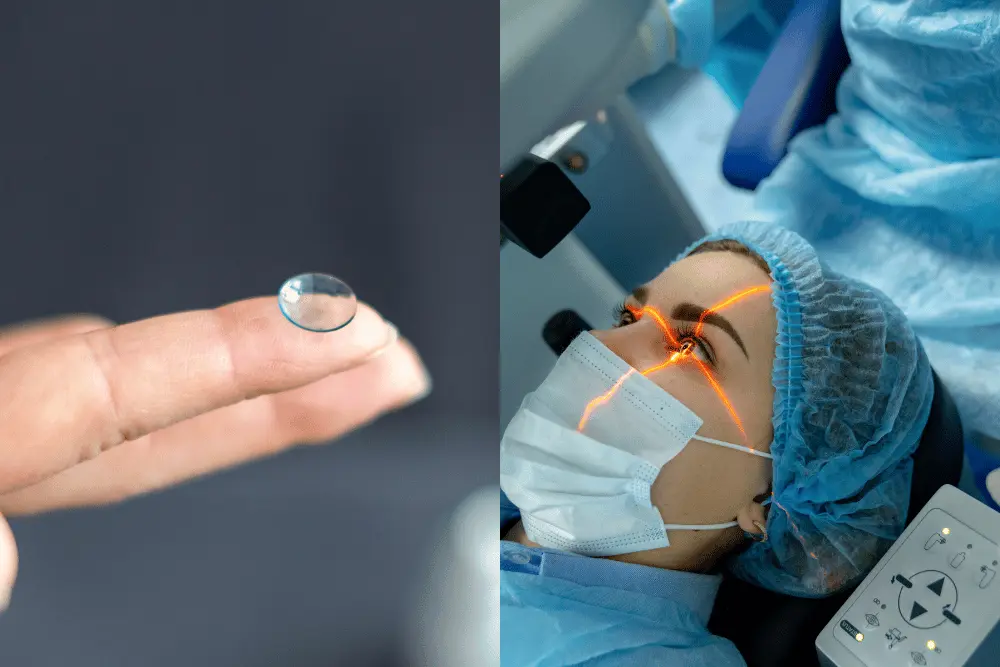If you’ve been looking for a way to see clearly without glasses or daytime contacts, you may have considered both ortho-k and LASIK. These two vision correction options offer clear vision without traditional eyewear, but they work very differently.
At The Eye Center, we provide ortho-k in Pembroke Pines as a safe, non-invasive way to correct vision overnight. We also offer LASIK consultations to help you determine if laser vision correction is a good fit based on your prescription, eye health, and long-term goals.
Whether you’re looking for a non-invasive, reversible option or considering a more permanent solution, comparing ortho-k and LASIK can help you decide on the best option for your needs.
What is ortho-k?
Orthokeratology (ortho-k) is a non-surgical vision correction method that uses specially designed gas permeable contact lenses. The contacts gently reshape the surface of the cornea while you sleep. When you remove the ortho-k lenses in the morning, you can see clearly throughout the day without needing glasses or contacts.
Ortho-k is most commonly used to correct nearsightedness (myopia), but it can also help with mild astigmatism and other refractive errors. It’s also a popular choice for children and teens as part of a myopia management plan.
What is LASIK?
Laser-assisted in situ keratomileusis (LASIK) is a surgical procedure that permanently reshapes the cornea using a laser. By changing the shape of the cornea, LASIK alters how light focuses on the eye, reducing or eliminating the need for glasses or contact lenses.
The procedure typically takes about 10 to 15 minutes per eye and has a relatively fast recovery time. Most people experience improved vision within 24 hours.
Key differences between ortho-k and LASIK
Non-surgical vs. surgical
Ortho-k is completely non-invasive. Orthokeratology lenses are worn overnight and removed in the morning. LASIK, on the other hand, is a surgical procedure that involves reshaping the cornea with a laser. For those who want to avoid surgery, ortho-k offers a reversible alternative.
Age and eligibility
Ortho-k is FDA-approved for children and adults and is often recommended for younger patients with progressing myopia. LASIK is not an option for individuals under the age of 18. Also, LASIK candidates need stable vision and healthy corneas.
Reversibility
Ortho-k effects are temporary. If you stop wearing the lenses, your cornea will return to its original shape, and your previous vision prescription will return. LASIK is permanent. While enhancements are possible, the changes to the cornea cannot be undone.
Recovery and downtime
Ortho-k requires a short adjustment period while your eyes adapt to the lenses. Vision typically improves within the first few nights of wear. LASIK offers rapid visual improvement, but there’s a short recovery period with activity restrictions for a few days.
Cost and long-term value
LASIK involves a one-time upfront cost. Ortho-k has recurring costs for lenses and follow-up visits, but it can be more cost-effective for younger patients who may not be ideal candidates for surgery.
Who is a good candidate for ortho-k?
Ortho-k may be a better option if you:
- Want a non-surgical solution to clear vision
- Are under 18
- Are not ready for or ineligible for LASIK
- Want to slow the progression of myopia
- Play sports or have a physically active lifestyle
- Have dry eyes that affect your comfort while wearing daytime contacts
Since ortho-k lenses reshape the eye temporarily, you can stop wearing them at any time with no permanent changes to your eyes.
Who is a good candidate for LASIK?
LASIK might be the right fit if you:
- Are at least 18 years old with stable vision
- Have a healthy cornea and no major eye conditions
- Want a long-term solution to reduce or eliminate the need for glasses
- Prefer a “one-and-done” approach without nightly lens care
If you have certain corneal issues, dry eye syndrome, or an unstable prescription, LASIK might not be recommended. A comprehensive eye exam can help determine your eligibility.
Let us help you make an informed decision
Choosing between ortho-k and LASIK comes down to more than just vision correction. It’s about how each option fits your life, goals, and eye health.
If you’re ready to take the next step, schedule an appointment with our team today. We’ll guide you through your options and help you make a well-informed decision.





